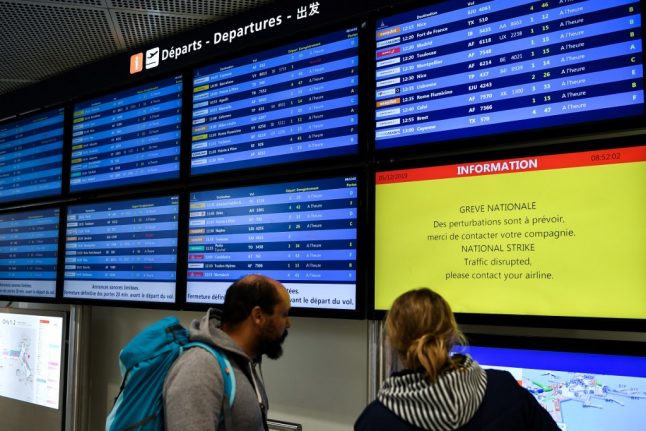The French civil aviation authority the DGAC has again asked airlines to cancel 20 percent of their flights on Tuesday, December 10th as strike action over pension reforms continue.
Flights had returned more or less to normal over the weekend after being disrupted on Thursday and Friday – the first days of the strike against President Emmanuel Macron's planned pensions overhaul.
READ ALSO French transport strikes – what happens next and how long will they last?
But on Monday afternoon the DGAC confirmed that it had again asked airlines to alter their schedules.
[GRÉVE NATIONALE⚠️]
Prévision du trafic aérien : Mardi 10 décembre
Réduction de 20% des programmes de vol au départ et à l'arrivée des aéroports de :
?Paris-Charles de Gaulle
?Paris-Orly
?Beauvais
?Lyon
?Marseille
?Toulouse
?Bordeaux— dgac?? (@DGAC) December 9, 2019
Airline ground crew at Air France are joining mass strike action in protest at plans to reform the French pension system – a move that unions fear will leave workers worse off and having to longer. The official retirement age in France is 62.
READ ALSO What are special pension regimes and why are the French striking over them?
One of the French air traffic controllers unions – although not the main one – has joined the strike, meaning any flight that enters French airspace is potentially affected.
Flights to the two Paris airports – Charles de Gaulle, Orly plus nearby Beauvais – are affected by the cancellations, as well as Lyon, Marseille, Bordeaux and Toulouse.
When flights were hit mast week it was mainly internal flights or short haul international flights that were affected by the strike. Long-haul international flights were not affected.
On December 5th Air France were forced to cancel 30 percent of internal flights in France as well as 15 percent of short to medium haul international flights.
Low-cost airline Easyjet were forced to cancel 233 flights to, from and over France.
Anyone flying in to Paris on strike days should also be aware that public transport to and from the airports is badly affected.
READ ALSO Flights, trains, ferries and buses – your strike transport questions answered.
Many unions have declared 'unlimited' strike action as they battle plans to reform and streamline the current, highly complicated system.



 Please whitelist us to continue reading.
Please whitelist us to continue reading.
Member comments